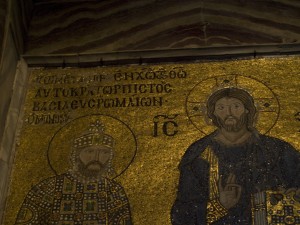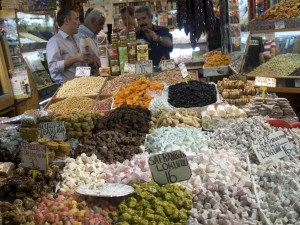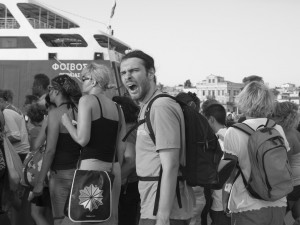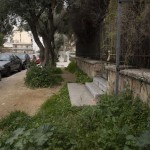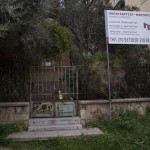Μετά απο αρκετό καιρό, επιτέλους άλλο ένα review για το Game 2.0! Αυτή την φορά, το δαιμονικό Dante’s Inferno έπεσε στα χέρια μου.
Διαβάστε πώς πέρασα βλέποντας πέη και στήθη δαιμόνων.
Category: Features
Cubilone’s Dimension 3.0 — The Corkboard
Ένα απο τα μυστικά (ή και… όχι τόσο μυστικά τελικά!) projects στα οποία δούλευα ήταν η ανακατασκευή του κεντρικού site. Απο τότε που το είχα κάνει ως εργασία στο μάθημα του CSS κάποια στιγμή πέρσι, δεν είχε αλλάξει καθόλου, και γενικότερα δεν ήμουν ικανοποιημένος με το αποτέλεσμα. Με την αφορμή του μαθήματος “Πολυμέσα και Πολιτιστική Παραγωγή” της κ. Μυριβήλη και την απαλλακτική εργασία στην μορφή ενός fun και πρωτότυπου portfolio site, άδραξα την ευκαιρία για να φτιάξω ένα πιο… φλασάτο κεντρικό site! Νομίζω πλέον πως τα πηγαίνω σχετικά καλά με το flash, και αν σε κάποια θέματα με δυσκόλεψε αρκετά η παραγωγή του συγκεκριμένου, τελικά πιστεύω πως βγήκε πολύ ωραίο. Ιδιαίτερα το soundscape μου με χαλαρώνει κάθε φορά που το ακούω, μερικές φορές αφήνω τον browser ανοιχτό μόνο για να το ακούω…
Φυσικά και θα το ανανεώνω συχνά, και ήδη έχω δρομολογήσει μερικές αλλαγές οι οποίες πρέπει να γίνουν σύντομα:
-Επιλογή/απενεργοποίηση ήχου
-Επιλογή για αγγλικά κείμενα
-Χάρτης και version info
Περιμένω σχόλια για το τι σας αρέσει, τι δεν σας αρέσει για το ψηφιακό μου πίνακα!
Cubimension 3.0 is here! 😀
http://www.cubimension.net
Αναμνήσεις απο ταξίδια σε πέντε αγαπημένες πόλεις
Μέσα στο κλίμα της εξεταστικής περιόδου κι εγώ, με ευχάριστο διάβασμα και ακόμα πιο ευχάριστη δουλεία σε γενικότερα ευχάριστες εργασίες, έφτασε η μέρα που όλοι περιμέναμε! Θυμάστε όταν μίλαγα για 4 εργασίες που είχα να κάνω, η δύο απο αυτές μυστικές; Ε και να μην τις θυμάστε δεν πειράζει… Η μία απο τις δύο φανερές είναι έτοιμη, και μιλάω για την εργασία στην Πολιτιστική Αναπαράσταση Ι, Cultural Representation για το ευρύ κοινό. Την παρουσίασα σε συμφοιτητές και καθηγητές χτες, και τώρα είναι online για την δική σας ευχαρίστηση. Το θέμα της εργασίας ήταν ο σχεδιασμός (και, όπως τελικά αποδείχθηκε, η υλοποίηση) μίας εφαρμογής η οποία θα παρουσίαζει το Τοπ 5 ενός θέματος απο μία αρκετά μεγάλη λίστα απο την οποία μπορούσαμε να διαλέξουμε. Εγώ προφανώς διάλεξα τα ταξίδια.
Τα υπόλοιπα εδώ ^^D:
www.hallografik.ws/oldstuff/flash/anamniseis.html

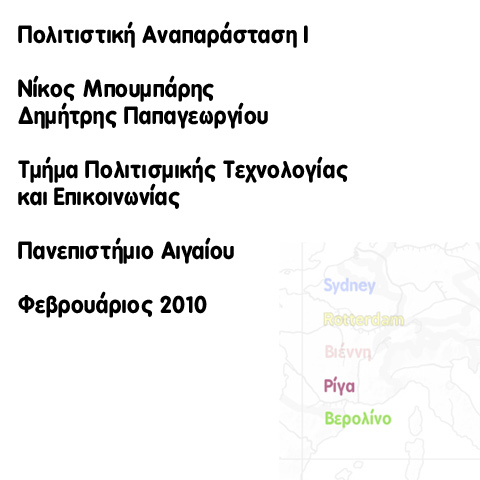
Ευχαριστώ τους καθηγητές μου, Νίκο Μπουμπάρη και Δημήτρη Παπαγεωργίου, που με βοήθησαν σε όλα το εξάμηνο και στο μάθημα.
I would also like to thank Dad for scanning and sending me the Sydney pics, I couldn’t have done it without him!
Picasso Smilie
^^D
Abandoning the System: Addendum
Not really an addendum, since I haven’t written any of this myself, just some links to very interesting texts about Facebook and what it is all about. They come as a nice addition to the original post and the discussion that it sparked.
http://www.guardian.co.uk/technology/2008/jan/14/facebook
(why Facebook is evil at its core)
http://mollyschoemann.com/2009/01/01/why-i-left-facebook/
(why Facebook is detached from reality)
http://wrathfulindifference.com/2009/01/08/in-defense-of-facebook/
(why Facebook has its uses)
Πολιτισμική σχέση Ελλάδας και Τουρκίας — Ιστορικό υπόβαθρο
Αυτό το κείμενο αρχικά ήταν μέρος του ανερχόμενου “Πέντε νύχτες στο Ίστανμπουλ (και μία στο Αϊβαλί)” αλλά άρχισα να γράφω, να γράφω, να γράφω… Τελικά αποφάσισα ότι θα ήταν καλύτερο σαν ξεχωριστό post.
Στην Κωνσταντινούπολη και στην Τουρκία γενικότερα, ένοιωσα κάτι αρκετά παράξενο. Ένοιωσα λες και όλα ήταν οικεία… αλλά ταυτόχρονα ξένα. Η συμπεριφορά των ανθρώπων και πράγματα τα οποία δεν θα περίμενες να βρεις εκτός Ελλάδας έκαναν την εμφάνιση τους παντου. Περίπτερα δίπλα σε τζαμιά με πανύψηλους μιναρέδες, τούρκοι που έπιναν τσαί αντί για φραπεδούμπα (nescafe: το μόνο αγαθό πιο ακριβό στην Τουρκία παρα στην Ελλάδα) παίζοντας tavla (τάβλι). Ήταν σαν μία Ελλάδα η οποία θα είχε επηρεαστεί για αιώνες απο την κουλτούρα του ισλαμικού κόσμου…
Οι Έλληνες έχουμε μια παράξενη ιδέα για τον εαυτό μας. Νομίζουμε πως απο την αρχή του χρόνου έχουμε υπάρξει ως μία ενιαία φυλή-κράτος-έθνος-θρησκεία-πολιτιστική οντότητα. Απο την αρχαιότητα μέχρι σήμερα, οι έλληνες έτρωγαν σουβλάκι, έπιναν ούζο, χόρευαν συρτάκι, παίζαν μια αρχαία παραλλαγή του μπουζουκιού σε σχήμα λύρας και φυσικά λάτρευαν τον Χριστό με την μορφή του αγνώστου θεού. Αν πάρουμε ως δεδομένη την ιστορία που διδασκόμαστε και πιάσουμε τα υπονοούμενα, οι κάτοικοι της Ελλάδας εδώ και 3500 χρόνια περίπου δεν έχουν αλλάξει σχεδόν καθόλου σε εθνολογική και φυλετική σύσταση.
Το ότι η Ελλάδα δεν υπήρξε ως “Ελλάδα” μέχρι το 1828 δεν φαίνεται φυσικά να πτοεί κανέναν. Το ότι Ρωμαίοι, Ανατολικοί Ρωμαίοι (Βυζάντιο), Σλάβοι, Ενετοί, Φράγκοι, Λατίνοι διαφόρων είδών, Εβραίοι και Οθωμανοί έχουν ζήσει και συμβιώσει με χριστιανούς και άλλους ελληνόφωνους απο την περίοδο της αρχαιότητας μέχρι και σήμερα στον Ελλαδικό Χώρο φαίνεται μια ασήμαντη υποσημείωση. Κι όμως. Αν σκεφτούμε ότι τα απο πάνω δεν είναι έθνη αλλά αυτοκρατορίες και ομάδες ανθρώπων οι οποίες ομαδοποιούνται σύμφωνα με πολιτισμικά και όχι φυλετικά στοιχεία, καταλαβαίνουμε τι παρτούζα τυριών, κοινώς fondue, αποτελεί την φυλετική καθαρότητα της σύγχρονης Ελλάδας.
Δεν μπορώ να πω πολλά για το πόσο οι κάτοικοι του Βυζαντίου αυτοπροσδιορίζονταν ως Έλληνες, γιατί δεν ξέρω πολλά για αυτό. Ξέρω όμως πώς για πάνω απο 1000 χρόνια δεν υπήρχε Ελλάδα, παρα μόνο Ρώμιοσύνη. Μάλιστα, η Ελλάδα σαν έννοια ήταν ταυτισμένη με τον ειδωλολατρισμό, την αρχαία φιλοσοφία, την δημοκρατία και όλα αυτά τα αρχαιοελληνικά, τα οποία δεν είχαν θέση σε μια χριστιανική αυτοκρατορία. Οι κάτοικοι, λοιπόν, δεν αυτοπροσδιορίζονταν ως Έλληνες αλλά ως Ρωμαίοι ή Ρωμιοί. Αξίζει να αναφέρω ότι ο όρος “Βυζάντιο” πρωτοχρησιμοποιήθηκε τον 16ο αιώνα για ιστορικούς σκοπούς (ευχαριστώ τον Άρη που μου πρωτομίλησε για αυτό).
Αυτοκράτωρ Πιστός Βασιλεύς Ρωμαίων… Αγιά Σοφιά
Όταν οι Οθωμανοί κατέκτησαν το Βυζάντιο τον 14ο και 15ο αιώνα, κατέκτησαν τα εδάφη αυτού που σήμερα ονομάζουμε Ελλάδα μαζί με τους χριστιανούς κατοίκους της. Πόσο διαφορετικό όμως είναι αυτό απο την κατοχή του χώρου απο μια Ρωμαίκη ηγεσία; Για σκεφτείτε. Η Ελλάδα σαν Ελλάδα υπήρξε θεωρητικά ελεύθερη μόνο κατα την αρχαιότητα. Απο τότε μέχρι το 1828 υπήρξε κατακτημένη απο αυτοκρατορίες μη “ελληνικές”. Η Ρωμαική και μετέπειτα “Βυζαντινή” Αυτοκρατορία κυριάρχησε στην Ελλάδα για σχεδόν μιάμισι χιλιετία. Τόσο πολύ κράτησε αυτή η κυριαρχία που διαμόρφωσε ριζικά τον πολιτισμό των κατοίκων των εδαφών της. Το ότι επελέγη η ελληνική γλώσσα σαν επίσημη στην αυτοκρατορία παίζει πολύ μεγάλο ρόλο σε αυτό, αφού επιλέχθηκε με βάση την διάδοση της στον λαό, εις βάρος φυσικά των ιερών λατινικών. Αυτό το βήμα ήρθε σχεδόν μία χιλιετία νωρίτερα απο το υπόλοιπο της Ευρώπης.
Με την επιλογή των ελληνικών ως γλώσσα, το Βυζάντιο έγινε μια για πάντα “δικό μας”. Εντυπώθηκε ανεξίτηλα σε όλες τις συλλογικές πολιτισμικές μνήμες του ελλαδικού χώρου. Αν δεν είχε γίνει αυτή η επιλογή, η αλλαγή της γλώσσας, δεν θα ήταν δικό μας. Και φυσικά ότι είναι δικό μας, είναι ολοκληρωτικά δικό μας. Δικός μας είναι ο χριστιανισμός, δικιά μας είναι η Κωνσταντινούπολη, δικιά μας ολόκληρη η Ανατολία!
Οι Οθωμανοί ήρθαν και το πήραν αυτό το δικό μας, και κυρίευσαν στον πρώην ρωμαικό χώρο για περίπου 400 χρόνια. Όμως, σε πλήρη αντίθεση με την καθοριστική 1500ετή κυριαρχία των ρωμαίων, σύμφωνα με την επικρατούσα αντίληψη αυτά τα 400 χρόνια ήμασταν σκλάβοι. Δεν υπήρξε καμία πολιτισμική ζύμωση απο τους Τούρκους προς τα εμάς. “Χάσαμε 400 χρόνια”, λένε πολλοί για την κατάσταση της Ελλάδας μετα-οθωμανικά. Αναρωτιέμαι εδώ: αν η τουρκοκρατία είχε διαρκέσει και αυτή 1500 χρόνια, θα είχε καταφέρει να καθορίσει πιο ολοκληρωτικά την ελληνική συνείδηση και εν τέλει να την διαμορφώσει σαν πλαστελίνη, όπως έγινε με το Βυζάντιο;
Έχουμε ελάχιστα αρχαιοελληνικά στοιχεία στην σύγχρονη κουλτούρα μας, και όσα έχουμε είναι αντιδάνεια. Οι Βυζαντινοί και οι χριστιανοί στην τουρκοκρατία δεν ενδιαφέρονταν για την Αρχαία Ελλάδα και τα ιδανικά της: οι μεν έκλεισαν την Ακαδημία, κατέστρεψαν την αρχαία πολιτιστική κληρονομιά ενώ οι δε ξεπούλαγαν ό,τι είχε απομείνει για πενταροδεκάρες στους ευρωπαίους. Η επιστροφή στις ρίζες ήρθε στο προσκήνιο μόνο μετά τον Διαφωτισμό και ήταν επακόλουθο (με την γέννηση του ρομαντικού εθνικισμού) να εξαπλωθεί και στην τότε υπόδουλη χώρα και να ανάψει τα αίματα. Ούτε πολλά στοιχεία του Βυζαντίου έχουμε κρατήσει, αν εξαιρέσει φυσικά κανείς τον χριστιανισμό και την πλειάδα ηθών και εθίμων τα οποία δεν χάθηκαν και έφτασαν στα χέρια μας αρκετά αναλοίωτα απο τότε.
Και επιτέλους, μετά απο αυτό τον αρκετά μακρύ πρόλογο, έρχομαι στο θέμα μου. Η “τουρκοκρατία” διαμόρφωσε την σύγχρονη ελληνικη ταυτότητα πολύ περισσότερο απ’όσο θέλουμε να πιστέψουμε. Το υποψιαζόμουν και πριν το ταξίδι μας αυτό, αλλά ζώντας την Κωνσταντινούπολη απο κοντά δεν έχω πλέον αμφιβολία. Οι μικρές πτυχές της καθημερινότητας στην Τουρκία μαρτυρούν περίτρανα το προφανές: περίπτερα, κράχτες παντού (στην Ελλάδα έχουμε εξευρωπαϊστεί πια και το έχουμε ξεπεράσει κάπως αυτό), κλαρίνα και αραβικοί ρυθμοί στην ποπ μουσική, κωμική ανυπακοή σε πρακτικούς νόμους (βλέπε απαγόρευση καπνίσματος… ας πούμε), μεγάλες οικογένειες με αλληλουποστηριζόμενα μέλη (“θα σε πάω στου μπαντζανάκη μου, έχει μια καταπληκτική ταβέρνα…”) και… μεγαλύτερες οικογένεις: διαφθορά, πελατειακές σχέσεις, ρουσφέτια. Αν πιάσω τις κουζίνες; Μπακλαβάς, τζατζίκι, μουσακάς, γύρος, ντολμαδάκια… Μπορώ να αναφέρω τουρκο-ελληνικές λιχουδιές μέχρι αύριο! Αν υπάρχει ένα στοιχείο όμως το οποίο να αποδεικνύει ακράδαντα την πολιτισμική μας συγγένεια πρώτου βαθμού με την Τουρκία είναι η γλώσσα.
Lukumια…
Είναι αυτό που μου έκανε μεγαλύτερη εντύπωση. Έβλεπα τόσες άσχετες λεξούλες τις οποίες μπορούσα να καταλάβω που αποφάσισα (μετά την δεύτερη μέρα) να τις σημειώνω. Θα τις αναγράφω όπως τις έβλεπα και με την ελληνική προφορά σε παρένθεση. Τα συμπεράσματα δικά σας…
huzur (χουζούρ)
tavan (ταβάν)
baklava (μπακλαβά)
boya (μπογιά)
gişe (γκισέ)
markuç (μαρκούτς)
nargile (νάργκιλε)
portokal (πορτοκάλ)
fistık (φιστίκ)
peşkeş (πεσκές)
ispanak (ισπανάκ)
havuzu (χαβούζου)
kuru (κουρού… αυτό νομίζω ότι σημαίνει καυτερό)
yuvarlak (γιουβαρλάκ)
bürek (μπουρέκ)
buyum (μπουγιούμ = μεγάλο. Παραπέμπω στην λέξη “μπούγιο”)
küçük (κουτσούκ = μικρό. Παραπέμπω στην λέξη “κούτσικο”)
peçet (πετσέτ)
kese (κεσέ)
sakula (σακούλα)
çay (τσάι)
kurasan (κουρασάν, χωρίς πλάκα, έτσι το λένε)
mantar (μαντάρ = μανιτάρι)
karida (καρίδα = γαρίδα)
pancar (παντζάρ)
marul (μαρούλ)
çipura (τσιπούρα)
bayrak (μπαϋράκ)
çoban (τσομπάν)
bodrum (μποντρούμ)
dolma (ντολμά)
fidan (φιντάν)
barut (μπαρούτ)
tufek (τουφέκ)
pilaf (πιλάφ)
cacik (τζαντζίκ)
musaka (μουσακά)
meze (μεζέ)
rakı (ρακί)
lukum (λουκούμι)
kahve (καχουέ)
Σχετικά με τον καφέ, θα ήθελα να αναφέρω ότι διαδώθηκε στην Δυτική Ευρώπη απο την Οθωμανική Αυτοκρατορία, και απο αυτή την λέξη υπάρχουν όλα τα ευρωπαικά παράγωγα… Ο ελληνικός καφές λεγόταν τούρκικος μέχρι το 1974, μέχρι που έγινε η εισβολή στην Κύπρο και στην Ελλάδα άλλαξαν το όνομα για λόγους μαρκετινγκ και απο τότε έμεινε… Αυτό σύμφωνα με την Wikipedia.
Εκεί που θέλω να καταλήξω: υπάρχουν πάρα πολλές αναφορές σε σχέση με την Αρχαία Ελλάδα προ Χριστού. Όμως, το τι πραγματικά έγινε στoν πολιτισμό στον οποίο οφείλεται, υποτίθεται, η Αναγέννηση και ο Διαφωτισμός, κατα την διάρκεια αυτών, δεν αναφέρεται στα βιβλία ιστορίας και δεν συναντάται επισήμως στην ελληνική ταυτότητα, παρα μόνο (λίγο πλέον) στην λαική παράδοση. Είναι τόσο μεγάλο μέρος του ποιοί είμαστε στ’αλήθεια. Όμως όχι μόνο το αγνοούμε, το απαρνιόμαστε. Αντι αυτού, προτιμάμε φυσικά την εξέχουσα παγκόσμια θέση που μας προσφέρει ο τίτλος της “πατρίδας του πολιτισμού”. Επιμένουμε να βλέπουμε σκιές του παρελθόντος για να νοιώθουμε λίγο καλύτερα με το αστείο το οποίο σήμερα λέγεται Ελλάδα. Πού είναι ο σημερινός πολιτισμός; Πού είναι η σημερινή Ελλάδα που όλοι καμαρώνουν ότι είναι η γεννέτειρα του; Όλοι ξέρουμε (ή τουλάχιστον λέμε πως ξέρουμε με αστειάκια του στυλ “Μεγάλοι Έλληνες”, λες και η πλειοψηφία των ελλήνων ξέρει τι έλεγε ο Αριστοτέλης ή ο Πλάτωνας…) για τον Leonidas, την Ακρόπολη και τους Ολυμπιακούς Αγώνες, θέματα ελάχιστης σημασίας για τον σύγχρονο έλληνα αν το καλοσκεφτούμε, ενώ κανείς δεν ξέρει πώς ακριβώς αρχίσαμε να λέμε “ντουγρού” και γιατί ο πρώην πρωθυπουργός μας λεγόταν Καραμανλής.
Αυτή η υποκρισία είναι κάτι το οποίο κατακρίνω και θα κατακρίνω. Όπως λέει και η Αλεξάνδρα “είναι σαν να είσαι εσύ κακάσχημος και να περηφανεύεσαι που ο παππούς σου ήταν πανέμορφος”. Το μόνο που κάνεις είναι να θαυμάζεις τον παππού σου, να ξεχνάς τους γονείς σου, και να μην κάνεις τίποτα για να γίνεις εσύ ο ίδιος καλύτερος… Το μόνο που καταφέρνουμε είναι να διαιωνίζουμε ένα κατασκευασμένο μίσος και πεισματικά να κοιτάζουμε τις διαφορές μας, αγνοώντας πλήρως τις σημαντικές και αξιοσημείωτες ομοιότητες ή και επιρροές οι οποίες διαφαίνονται μετά απο 400 χρόνια συμβίωσης.
Ένα ενδιαφέρον link, το οποίο αν και δεν συμβαδίζει πλήρως με τις ιστορικές απόψεις τις οποίες εκφράζω, έχει αξία στο πώς προβάλει την ποικιλότητα των φυλών που απάρτιζαν την Ρωμιοσύνη και την περιπλοκότητα του θέματος. Για πολύ λίγους, και κατα πάσα πιθανότητα ούτε καν εμένα. http://drgvichia.blogspot.com/
Plus*2/Minus*2 Summer Edition! Part 2
Ships, ships, ships, only a pee away from shit.
I believe that I was one of the best customers of the shipping companies this summer. A normal person wouldn’t take more than 4, 5, a maximum of 6 ships during the summer. Not me. Hohoho, not me. Between mid-May and my trips to Athens for supporting Alexandra’s exams effort and mid-August and our return to Mytilini, I travelled in a grand total of 18 ships (not 18 unique ones). My rough estimation is that I spent a total of 156 hours of this time travelling at sea. That’s about a week’s worth of non-stop travelling!
The problem is that greek ships are, well, shippy. I mean shitty. Most of them are old, the new ones are too expensive, the food and drinks on board are ridiculously expensive, they go slower than what they claim to in order to save fuel… They treat passengers as if they’re worthless sheep. Even when some of the crew are trying to be polite, you know that the general company policy is “passengers are sheep, and you are the herders!” It’s just a huge industry of money-thirsty shippers. They are the ones who control the Aegean Sea. I really hate them all. What I hate the most is the spam with which they bomb you on board: the safety messages, the cheesy music (especially ANEK’s, although Hellenic Seaways is epic as fuck! Tan-taaaaaan, tan-tan-taaaaaan…), “passengers wishing to di(n)e are kindly requested to proceed to the self-service restaurant, “due to increased truck, the ship will delay”, I could go on forever! These can be a good source of amusement for the first few trips but after hundreds and hundreds of hours on board it gets kind of… annoying.
Anyway, it’s no wonder I find it ironic when people wish me a good journey before I hop on a boat for the umpteenth time; it’s become a second nature finding a comfy spot, laying my sleeping bag, watching One Piece or reading a book for tens of hours at a time, no matter how shippy the shits are! Oh, the joy of studying 12 hours worth of voyage away from your own, but also your girlfriend’s, home…
Destruction of small neighbouring house
Ever since I was knee-high to a grasshopper, I remember walking by a strange old house on my way to school and the neighbourhood mini-market. I could see this house from the heights of the balcony of my room for many years. It was a nice old abandoned house, with dense foliage and many cats living around. I never really knew if anyone did live there, apart from the cats. The guy owning it supposedly died at some point and his wife moved to another house.
A few months ago, to my great astonishment, mum told me that they had put up a sign in front of the house announcing that the house would be demolished and a brand new block of flats would be built in its place. Right then, I felt as if part of my childhood died.
The actual demolition only started in July. Hammers and bulldozers worked furiously every morning. The noise of course was too much to handle so me and Alex always had the balcony door closed, which led to extreme temperatures building up in my room. Mum warned me that during most demolitions swarms of cockroaches crawl out of the fresh ruins looking for new homes. Not really into the idea of hosting a dozen or ten cockroach clans, we decided that we shouldn’t leave the balcony door open even at night.
This went on for many weeks. Even when we left Athens a few weeks ago, terrible machines were still digging for the foundations. The hole was already abyss-like in depth.
In a few months from now, my once bright room will become dark and gloomy. This new apartment building will block all light coming to the back side. But it’s not only this. When certain things occur, it just hits you that you’ve grown old enough to see the world change. Nea Smyrni has sure changed in the 15 years that I remember it. The Alsos next to our home, the new parking, Nea Smyrni square, the tram… The city has even expanded during my lifetime. Places I remember as being just soil and nothingness (at the borders with Brahami) are now fully urbanised. Nea Smyrni has sure changed.
Recently, I found out that Nea Smyrni was originally meant to remain a lower density suburb. The height of apartment buildings used to be regulated everywhere in the city but along Syggrou Ave. Only after 1974 and the fall of the Junta were the regulations revised. Ever since, the number of small houses has fallen dramatically. I don’t think the surviving ones will be around for much either, unforunately…
Alexandra’s Dream ![]()
![]()
Quick question: What had Alex been doing the past year? I’ll let you think for a second. Yeeees…
If you haven’t remembered by now, allow me to remind you. She was studying for her Panellinies!
Yes, Panellinies. This little final exam that gets all 17-year-old nervous and their parents broke. This exam that’s stuck somewhere between the Middle Ages and the Paleolithic Age that forces teenagers to decide what they’ll do for a living within a matter of months. This incredible exam that works by somehow making mathematics, greek language and physics only slightly less important than special subjects when calculating points for entry in the university or school of choice. I could go on.
Alex had a strange experience last year. When we met, she was studying German so that she could go to Austria and become a better musician. Apparently though, she had a change of heart somewhere along the road and decided that she did not want to either leave me, her country, (the rest of) her loved ones ;P or all that. To just suddenly go and live abroad for almost 6 years. I agree, that would be a shock, even though shocks can be useful from time to time. All was good then. She didn’t have to leave and we could stay together. Here comes the strange experience though: she realised that she was already 22 and had not lived the life of a student, she hadn’t gone through this magical process of living on her own! Many times before had this change of scene been delayed and her not going to Austria was added to the list. What was she to do?! Oh the horror! I can still remember when we were talking on MSN and she was panicking about her future, or lack thereof, as it seemed at the time at least.
The answer came quickly. She did not have to move out of Greece to receive the musical education of her dreams. A bit of research later and along came Musical Studies Dept, Ionian University, Kerkyra (Corfu… silly name). It sounded like best thing since Geometry Wars. Indeed, all opinions agreed on how it was one of the best, if not the best, musical universities in Greece. The problem? She couldn’t just walk in and start lessons; she had to be admitted. And how do people get admitted to universities in this day and age? Exactly.
Panellinies was the name of the game and Alex was more than willing to play. She even travelled to Kerkyra to see for herself before doing anything rash. Typically, she fell in love with the town and student life. I was slightly depressed at the time; no matter how good and well it is in Mytilini, I will never forget my disappointment when I failed entering Audiovisual Arts in the Ionian University.
All this was around this time last year. Alex did play hard. Harder than I expected. I was telling her “you’re gonna get in, but only just. You’ll be too lazy to get a better score, but not lazy enough to fail”. This year we even met every weekend almost, much more often than last year. She’d have all the excuses in the world to not go very well. But she did. And it was awesome.
In May I watched her as she fought hard for her 6 compulsory subjects: greek, maths, biology (easy and hard mode), physics and chemistry. If you’re wondering what all that has to do with music, well… don’t ask! Her score was a very satisfying 14860, thousands of points above the previous year’s minimum. She hadn’t even begun with her music subjects yet! But that was the catch; one wrong step at that point and all would have been for nought as it’s necessay to have a score greater or equal to 10/20 in both music subjects to get into a university musial dept.
The harmony exam was a breeze, Alex got more than 18 in that one. Dication was a surprisingly cruelexam though. It was plain evil. Girls got out of the exam centres crying, everyone was pessimistic, it was a mess. Alex was on the positive side although not certain and got a 12 finally, thus securing her entry in the uni and ending a few weeks of nervous uncertainty for both of us.
A few weeks ago the official result were announced and as we all expected, Alex is among the people that will be studying Music in Kerkyra starting this year. She’ll probably be getting a laptop too for her superb results!
It’s been a happy story till now. But there is a darker side to it, as the most perceptive of you will have noticed.
Till now, our relationship with Alex has been mostly uncomplicated. I live in Mytilini, she lives in Athens. A big obstacle for some that we jumped over easily. As if it did not even exist. Only rarely has distance ever affected our relationship. Distance can also be refreshing for a relationship. As I said in my previous Plus/Minus, travelling 8-12 hours at a time is manageable, as is travelling twice a month to Athens and back. No big deal, right?
Right! But what about… 24 hours worth of travelling? Starting in a few weeks, Alex will live in Kerkyra. That will be her effective home. Consider this: Mytilini is on the border with Turkey; Kerkyra is on the border with Albania and the western-most island of Greece, only a few hours away from Italy. How will this ground-shaking change affect our relationship?
This past summer I’ve been thinking about all these things. Not just me, of course. Alex has been just as pondersome. This feeling that our days are numbered hung, and still hangs over us, affecting our emotions. The natural response is to try and make use of these remaining days the best way one can. This often backfires… The looming sensation that time is running out often makes one take even less advantage of what time really remains. But maybe it’s because deep down we refuse to believe, no, we refuse to make the “time is running out” a facet of our reality. I still do not feel as if it’s anywhere close to being over. On the contrary.
All that said, how does this imminent change (and its awaiting) strike me, in the end?
![]() : Alexandra’s finally finding her career path. It is the change she’s been waiting for years. She’ll do what she loves most and get even better at it. I can’t even imagine what great music she will compose! She will find new friends in the ultimate artsy-cultural university city in Greece. I am really and sincerely happy, most of all, that she’s getting exactly what she fought for, she’s doing what she dreamed of doing. It is something a lot of us forget to do nowadays. We compromise. We think too much of what people will (or won’t) say or what people will or won’t do as a reaction to our actions. Alex is setting an example. An example of purity of intent. How difficult is it for us people to know exactly what we want to do and be sure that it is exactly what will make us happy? Besides: travelling to Corfu? Count me in!
: Alexandra’s finally finding her career path. It is the change she’s been waiting for years. She’ll do what she loves most and get even better at it. I can’t even imagine what great music she will compose! She will find new friends in the ultimate artsy-cultural university city in Greece. I am really and sincerely happy, most of all, that she’s getting exactly what she fought for, she’s doing what she dreamed of doing. It is something a lot of us forget to do nowadays. We compromise. We think too much of what people will (or won’t) say or what people will or won’t do as a reaction to our actions. Alex is setting an example. An example of purity of intent. How difficult is it for us people to know exactly what we want to do and be sure that it is exactly what will make us happy? Besides: travelling to Corfu? Count me in!
![]() : The distance between me and Alex will soon double. What will happen between us? Taking for granted that we will keep on seeing eachother no matter what, there are two scenarios within sight:
: The distance between me and Alex will soon double. What will happen between us? Taking for granted that we will keep on seeing eachother no matter what, there are two scenarios within sight:
1. Distance only makes us realise how much in love we are with eachother. Our less frequent meetings are much more intense and we live happily ever after.
2. We’ve thought of giving eachother the freedom to experiment with random people if we so wish (now we’re yound and free etc) while still, in theory at least, remaining a couple. I can already imagine the clusterfucks such a scenario might produce, the jealousy and quarreling… but we will end up together in the end, and we’ll live happily ever after.
Whichever of these 2 scenarios happens, increased solidarity is something that might help me concentrate on my last year on this island and all this might implicate…
: …but it’s all nice and good declaring beforehand that my last year in Mytilini will be be better if I concentrate on Mytilini-centric activities. How can I say that when I’ve been with Alexandra for more than 1.5 years already?! I may not have forgot how it was before her, but I sure don’t know how it’s going to be after her. They say that you only really appreciate something when you’ve lost it…
:…and even if I won’t have lost Alex, it will be harsh. It’s coming closer and closer, and the closer it comes, the harder it hits me. The day I’ll take the ship to Mytilini and she won’t follow me… and knowing that after a few days she’ll be in Kerkyra, in one of the most important moments of her life, and I won’t be there for her… and also knowing that being there would only make it worse for her… but definitely, I don’t wanna think about that day…
OK, OK. That last part was a bit emo. But you can’t help it. Most emos become emos over stuff like this. Now just let me look at the glass half-full again…
Done!
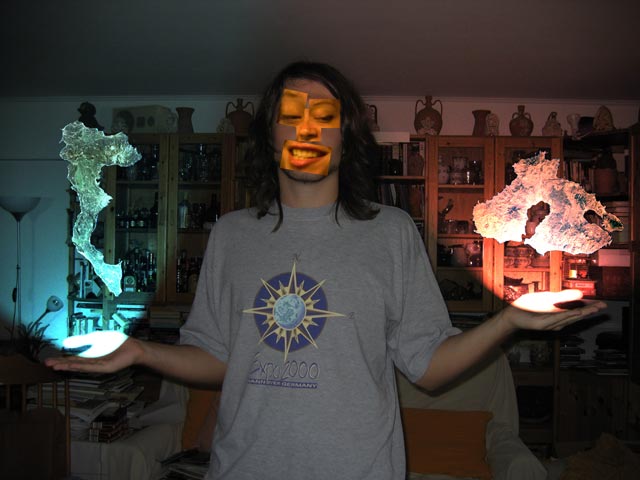
Αλεξάνδρα’s Big Mishtakey
Παράθεσα το πρώτο post του Big Mishtakey της Αlex και στο Cubilone’s Dimension. Είναι όμως παραγωγική τον τελευταίο καιρό — πιο πολύ απ’ότι εγώ, οπότε το να καρφιτσώνω όλα της τα ποστία θα ήταν μάλλον άσχημο. Αντίθετα, βάζω συνδέσμους εδώ, άντε μπας και σπρώξω καθόλου την κίνηση. ;D
Θίνγκς Αϊλ Σόρελυ Μις Νάμπερ Ουάν- Geometry Wars Retro Evolved Ίσως το καλύτερο ποστ ever σχετικά με ένα απο τα καλύτερα games ever. Απολαύστε τις εμπειρίες της Άλεξ σχετικά με το Geometry Wars – -ένα παιχνίδι αγάπης… και πολέμου.
Μπίτς & Πίσες Νάμπερ Ουάν Ποιός θα έγραφε για την αναρχία, τα κρουασάν και ένα παιχνίδι με ωραία ambient μουσική στο ίδιο ποστ; Μα ποιός άλλος;
Ποιά είναι η Πίξιγουίξι; Άραγε;
Plus*2/Minus*2 Summer Edition! Part 1
![]()
![]()
Kalo mina. It is September already, isn’t it. I’ve been writing up the following post for almost a month now. Day by day, hour by hour even, more and more stuff is added to this list. I can’t keep up anymore! Originally this was intended to be a complete ++– of my summer highlights… This is quickly becoming overwhelming, what with the summer not being over yet and bits and pieces of my life constanstly becoming potential highlights. I will post what I’d already written weeks now and see how it goes. Oh and I’ll start with the most recent ++, what took most of my time these days actually.
~
August.The cicadas are chirping, Taurus and Orion have just started to appear a few hours before dawn, summer is depressingly close to its end. Depressingly? This word is up for discussion. Yes, I do agree that summer is almost over and that that is generally considered a bad thing but no bad thing has ever come with no benefit; autumn is right around the corner and along with it comes everything that symbolises our hopes, plans and process of renewal. Everything flows, said Iraklitos (and the Book of Change).
Enough with this little introduction. What I want to share with this post is the good, the bad, the attrocious and the fantastic of this year’s summer, which (for good or bad, you decide in the end!) is over in a few weeks, at least theoretically (cause really, who knows till when the weather’s going to be happy this time around?) In short, I’m giving you another Plus*2/Minus*2. And this one is going to be loooong!
Flash, Grafistiki and September Exams ![]()
This year the comeback to Mytilini has come earlier than usual. I had long decided that this time I would stand 100% ready for the upcoming exams. I would study a lot, do all my projects in time etc. August 21st was the day we returned to the island. Happy Rock Band 2, Mordread’s birthday and Alex’s nameday aside, it hasn’t been all that fun for me! First thing I wanted to do was complete my Flash/Grafistiki project. A couple of bucketfuls of tears of *insert feeling here* later (including joy, frustration, achievement and despair) and stinking my chair from sitting in it for tens of hours, I can proudly say that today, just in time too, I presented my work to Myrsini. And it was good! It has got to be one of my most advanced works to date. It being in Flash makes it even more impressive of course. I invite you all to have a look and tell me what you think:
www.hallografik.ws/oldstuff/grafistiki
This, of course, is only a sign of things to come. I can stand proud, can’t I??
Today was special in another way as well. I sat for another two subjects, namely Java and Image Editing. Too much effort put into the Flash Project, of course I didn’t have the time to study them properly. Yet I didn’t do all that badly. I think it’s been a successful day… But I REALLY WANNA PLAY SOME GAMES! I MISS THEM. And even though Alexandra is around and has helped me considerably with housework, cooking, cleaning, relaxing, keeping in touch with the real world etc… I do not think we’re spending our time together as we should be. I mean…
…nah, this is another highlight in its own right.
Salonica: City of Ghosts, by Mark Mazower ![]()
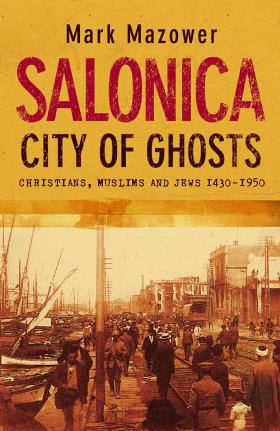
I finished reading this book in June. I must have mentioned it before, or maybe it was Mazower’s “The Balkans”, a short introduction to the regional history, especially during Ottoman times. “Salonica” is similar. It takes you from the creation of the city in ancient times to what it is today, focusing on its multicultural identity during Ottoman rule (1430-1912) and until the Second World War and the jewish holocaust which killed a significant part of the population.
Did you know that Thessaloniki was only founded after the death of Alexander the Great? Kassandros, the guy who got in charge of the province of Macedonia after Alexander’s death, named this newly founded town after his wife Thessaloniki, daughter of Philip II and thus Alexander’s sister. So why the statue of Alexander in the centre of the city? Why has the city been so closely connected to Macedonia and indeed Alexander?
Did you know that in the 16th century thousands of sephardites, jews that were pursued out of Spain, emigrated into Salonica? They remained the majority (!) of the city, with muslims coming second and christians (greek and slav speaking) third. These jews really considered Salonica their home, they spoke a strange dialect of spanish changed throughout the years from their contact with turkish and greek. During the Second World War most were killed by Nazi Germany and their plan to eradicate the world’s jews (along with other unwanted elements).
Did you know that Salonica became a greek city in 1912? The greek revolution may have happened in 1821 but before 1912 the modern greek state’s borders had not yet changed into the form we know them today. Salonica, along with most of the Eastern Aegean islands and later Thrace, were conquered in the First and Second Balkan Wars by the Greek Army. Salonica wasn’t a particularly greek city before that. As I said, greeks were the minority. However, within 10 short years and after the Population Exchange that made all the muslims leave the city, Greece used the poor immigrants from Asia Minor, some of which did not even speak greek, to effectively “hellenize” its newly conquered territories with christians. Descendants of Macedonians? I don’t think so.
The rest is, as they say, history. Leaving 400 years of (mostly) peaceful and tolerant coexistance behind, the greeks swiftly destroyed everything that would remind them of “the dark ages”. A lot of the historical city centre was burnt in the Great Fire of 1917, however most buildings that had survived did not make it into contemporary, metropolitan Salonica. The “neogreeks” of course have dug up any roman or byzantine (to be fair, Thessaloniki was an important byzantine town, with Ayios Dimitrios and everything…) building that is possible to find, at the same time trying to hush-hush, forget and destroy history, situations and buildings much more relevant to the Greece of today and not the Greece we would like to once have existed.
“Salonica: City of Ghosts” tells a story you’re not likely to hear. It tells of Salonica’s cosmopolitan days, of when it was a crossroads of cultures. A true multi-culti gem. It was a book that gave me a brand new perspective on matters with superb research and excellent, gripping writing. It made me want to visit Thessaloniki, even if the Thessaloniki it desribes is long part of the past…I recommend it to anyone who might want to study revisionist greek history but also the history of the Balkans or the Ottoman Empire.
Did you know that the White Tower was an Ottoman prison?
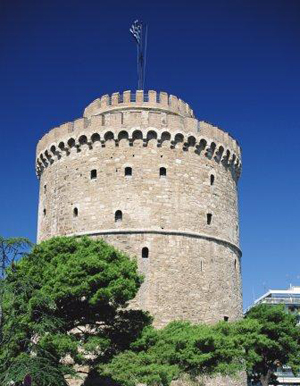
June Exams ![]()
I can say that I was quite satisfied with my exam results. I did not sit for many subjects. In fact, 2 of them I sacrificed in order to have time to go to Rodos in mid-June. For those I did sit for, however, I could not have gone better! Stefanos and me, together with the –let’s face it– minor contribution of Anna and Vasilis, worked on a Flash application during May and June that represents the various kinds of relationships students have with Ermou St. in Mytilini. This was for Cultural Representation II. It gave us a straight 10, for all its misgivings (I’ll make sure to upload it in the main site as soon as possible!) This project’s design along with some personal graphic designs scored me another 10 in the respective subject.
Last but not least, I got another 10 at perhaps my favourite subject last term: Cutural Industries and Digital Culture. Despina Catapoti was our mentor, a great person and teacher! She turned the subject I failed one year ago into a fresh, postmodern-counterculture-philosophical experience! I got a 10 for my answers to the inspired, open-ended test. But I give her a 10 as well for her very interesting, knowledgeable lectures and her special way with the students. I can only say that I cannot wait to learn beside her once more come Spring.
I got a 2.5 at Montage and that thanks to the… interesting video Garret and me made one day at the lighthouse. 😛 Otherwise I would have got a 0. I’ll be quietly sitting for this one soon.
Counting Sheep, by Paul Martin
![]()
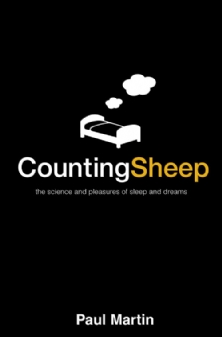
Picking up books on random, fascinating subjects as I sometimes do, this summer I got a book on sleep called “Counting Sheep”. Alexandra used to mistakenly call it “Science of Sleep”, like the movie. I thought it was funny mixing the two names up! On a side note, we still haven’t watched “Science of Sleep” in its entirety.
“Counting Sheep” is the ultimate book on this 1/3 of our lives when we “go comatose while hallucinating vividly”. REM sleep, which is the scientific term for dreams, actually occurs for just 25% of sleep in adults. The rest is NREM (non-rapid eye movement) sleep. This is the wiki on NREM, pretty interesting. NREM is vastly different from REM in many aspects, in fact brainwaves during this state are much more characteristic than the respective REM ones (which are, unsurprisingly, similar to our waking state ones). Our sleep can thus be divided into two distinct states which leads to the conclusion that we go through three unique cycles, not just two: waking state, NREM and REM. Each cycle of sleep roughly comprises 90 minutes, going through the 4 stages of NREM sleep and finishing with REM. A typical night’s sleep will consist of 5-6 cycles…
…I can’t stop! Here I am typing scientific stuff about sleep from the top of my head. I could go on. But “Counting Sheep” is not just excellent explaining how sleep works. It goes through all kinds of culture that has been created around sleep, beds, caffeine, dreams, lucidity, sleep disorders, it tells tales of horrible sleep-deprivation and resulting torture, it outlines how sleep works in animals (every single living being, even bacteria, display some kind of low-activity cycle — dolphins sleep one brain hemisphere at a time!) and perhaps most important of all, it definitely proves that sleep is not only important, it is also a luxury and a pleasure unsung for – nevermind the ridiculous numbers of relevant William Shakespeare quotes.
“Counting Sheep” makes you want to rush to your bed, hug your pillow, rub your feet under the quilt, hang a hammock from the trees outside your door or in case you have no trees plant a couple for this very purpose. It makes you cherish your only pure and unfiltered existence and not feel guilty about that couple of extra hours under the blanket. This book proves that the world would be a much, much better place if only politicians, drivers and nuclear reactor operators took their40 winks more seriously. If you, like all too many of us these days, think that sleep is nothing but wasted time, you ought to make yourself a favour and read this!
Gytheio ![]()
Urk. Gytheio is supposedly the correct way of writing the greek town name in English. But you pronounce it “Yithio”!
Anyway, I went for 3 days and 2 nights to Gytheio to find Fanis and a couple of his friends who were camping there and stay with them. It was fantastic! I had only ever camped once in my life before (Bouka Beach Club! Savi, Tousis!) and it was great, not to mention 3 years ago. So I had a great, fantastic time camping again.
The beer was cheap, the friends’ friends I met there were pretty interesting and unique people (a 15-year-old bassoon-player rocker anime lover? A 17-year-old who was exactly like Garret in almost every way, except he liked One Piece and played the clarinet and was thus also musically inclined), everyone was relaxed but also cheerful and funny. I was at peace.
On the first night it was full moon. We made a fire on the beach, just like the second night. On the first one though we also went for a swimin the sea right in front of the fire. The moonlight was so bright and the sea so calm I could literally see the sandy bottom. But it wasn’t like looking at it under daylight. It was different, it was magic. I felt the sea different in spacial kind of way, as if I could really feel how deep it was or that I was actually floating in it at that point. It was truly something else.
Alina, another member of our charming little party, showed me her father’s camera. It was a Nikon F301 he’d had for almost 25 years! The sound of the shutter, the complete lack of electronics, the large viewfinder, the sturdy lens… It certainly didn’t take me a lot of messing around with it for me to realise that I NEEDED ONE OF THESE! So, oh what surprise, ever since I got back from Gytheio and that’s 11 days already, I’ve been hunting…
Camping is probably the best type of holiday. Not a care in the world, total relaxation, socialising, enjoying nature. Sleeping in a boiling tent just might be the highlight. I’m already looking forward to doing some more.
Deutsch ![]()
Dieser Sommer ich habe gedacht:”Ich hatte genug!” Danach habe ich mehr Deutsch studieren. Ich will das Zertifikat in Januar bekommen. Ehrlich gesagt hoffe ich, dass ich nicht zu faul bin… Mama ist aber eine gute Lehrerin!
KTEL
Buses have become, or have always been, I’m not really sure, the main means of transportation for those who want to go from one greek city to another. But they are so bad. The stations are dirty, the drivers are rude, the schedule is seriously strange, and the bastards have made it so that you can’t find out when your bus is leaving unless you call a high-cost helpline! They’ve even removed lists and schedules from the internet, at least from what I’ve seen.
Even more worrisome is the fact that there are no plans of expanding the train lines in any part of Greece. Actually, OSE announced during the summer that they are changing their routes so that only connections between the main cities are properly serviced. Where is the environmental planning? Where is ANY kind of planning at all? If you could go anywhere, anywhere at all, just by hopping on a bus, things would be different. If they weren’t so polluting or if the drivers were a bit more considerate about their clients music tastes, things would be different. But they aren’t. And as it is, people like me that object to owning a car have little choice. It’s depressing…
At least the tickets are relatively cheap. For now…
To be continued… with more amazing ![]() ‘s and even juicier
‘s and even juicier ‘s!
Game 2.0 — Gaming 2.0: Νέα εποχή, αμφιλεγόμενες τάσεις
Μέσα στην ζέστη του Αυγούστου και ενώ όλα πάνε καλά για το επομενο μου μεγάλο post, να σου σκάει το άρθρο μου στο game 2.0 το οποίο είχα γράψει ήδη απο τον Ιούνιο.
Πιστεύω ότι είναι ένα απο τα καλύτερα άρθρα μου μέχρι τώρα. Μπορείτε να το διαβάσετε εδώ.
Σημείωση: Τις εικόνες και τις λεζάντες δεν τις διάλεξα εγώ αλλά σίγουρα έχουν πλάκα!


